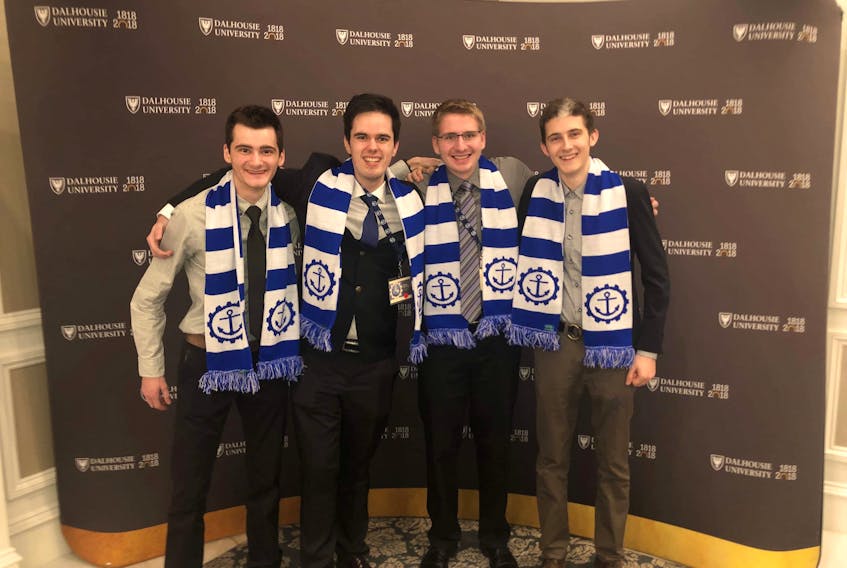WOLFVILLE, N.S. — A team of students from Acadia has put the university back in the national engineering spotlight for the first time in more than 10 years.
In January, Acadia sent two teams of four to compete in the Junior Design category at the Atlantic Engineering Competition at Dalhousie University. The category is open to first and second-year students from the Atlantic provinces.
There were 12 teams competing and one of the Acadia teams – made up of Lee Weber, Matthew Kneen-Teed, Matthew Hill and Cole Everson - won first place.
This earned them an invitation to compete at the national level, in the Junior Design Category of the Canadian Engineering Competition at the University of Waterloo against seven other teams. The Acadia contingent placed second in Canada, competing against the top engineering schools in the country.
Three of the team members, Kneen-Teed, Everson and Weber, are from Kings County and graduated from Horton High School in 2017. The fourth member, Hill, is a graduate of Hants North Rural High School in Kennetcook.
This was the first time in over a decade that Acadia had representatives at either competition. Kneen-Teed said the team was “blown away” by its performances, especially at the Atlantic competition, following such a lengthy hiatus for Acadia.
“We didn’t think that we stood much of a chance, so we were super excited about that, let alone going to the nationals,” Kneen-Teed said.
He said they all have an interest in the practical application of what they’ve learned with regard to design. At the competitions, teams are tasked with specific challenges dealing with the real-world application of engineering. The Atlantic competition involved designing a mechanism for the retrieval of plastics from water.
“They had an artificial basin and you needed to come up with some kind of attachment that would attach to a boat that would collect plastic in a time efficient and also cost-effective manner,” Kneen-Teed said.
He said the challenge at the Canadian Engineering Competition was more complex. Teams were tasked with coming up with a way to pump water from a lower tank to an upper tank and cleansing it of contamination using a filtration process. This was part of a hypothetical flash freezing scenario.
WINS BOLSTER ACADIA ENGINEERING
Acadia University Director of Engineering Dr. Paul Arnold said the team’s accomplishments would bolster the Engineering program at Acadia in general. It was a “very pleasant surprise” that the team showed so strongly during its first year competing.
He said it would encourage incoming students and help create more of a critical mass around the activity of design. It also helps reinforce a movement across the country to reintegrate design into engineering classes.
“It’s a very positive re-enforcement for us to continue to support the students and encourage them to work in areas outside the specific realms of academic circles and work toward team projects and group design work,” Arnold said.
This year, Acadia’s engineering society became involved with the Atlantic Council of Engineering Students and the Canadian Federation of Engineering Students. These committees hosted the respective competitions.
This past September, the design club for Engineering students was resurrected at Acadia. Like-minded students meet weekly to work on projects outside of their regular course load. Arnold said they have a modest workshop where students can bring some of their designs to fruition.
He said three of the four winning team members would be back at Acadia next year. Engineering students generally attend Acadia for two or three years before moving on to Dalhousie to complete degrees.
RELATED:









